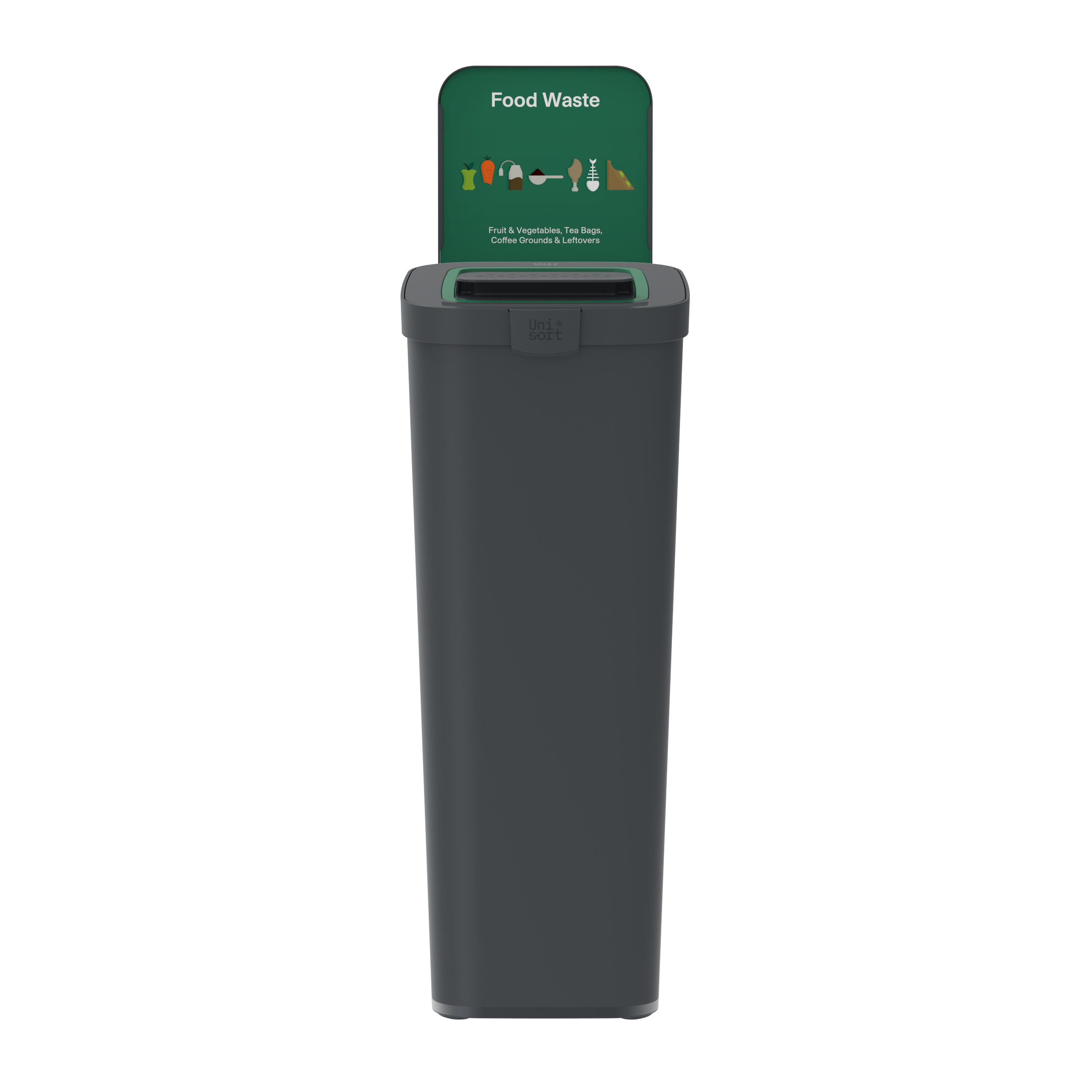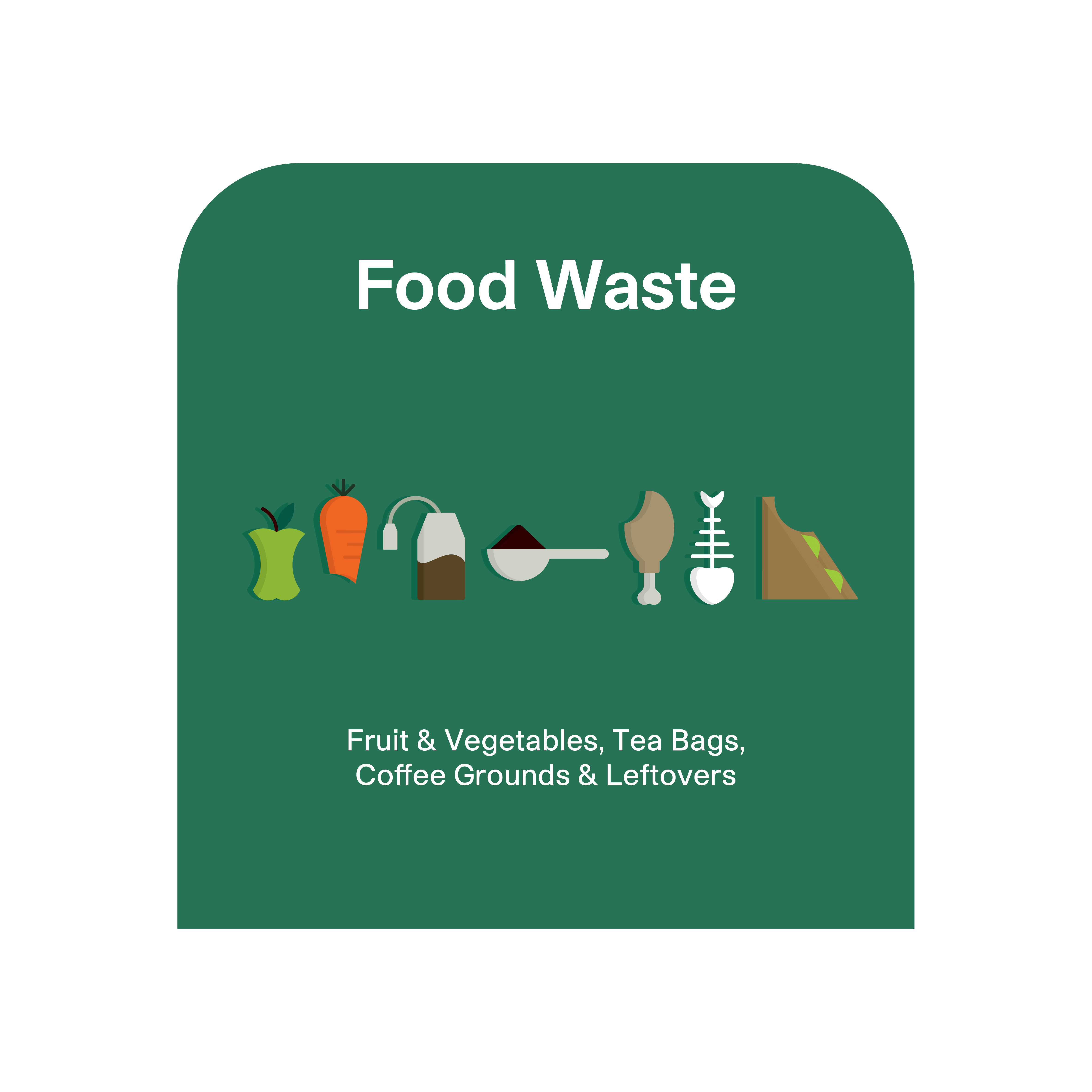Food waste recycling has become essential across UK businesses, where nearly 9.52 million tonnes of food go to waste every year. Surprisingly, this amount of food waste could feed over 30 million people annually, but in spite of that, over 8.4 million people continue to live in food poverty.
Food waste can have a negative impact on a business’s environmental footprint and economics and further to this, it’s reputation if not dealt with in the most environmentally responsible way.
Food waste recycling bins help to prevent the above issues and help UK businesses ensure correct segregation of food waste and reduce general waste efficiently and hygienically.
Keep reading to discover the importance of food waste recycling for businesses and how our solutions make a difference.
The Importance of Food Waste Recycling in Businesses
In the UK, businesses are responsible for a significant portion of food waste:
- 1.5 million tonnes (16%) of food waste comes from manufacturers.
- 1.1 million tonnes (12%) is generated by the hospitality and food service (HaFS) sector.
- 0.3 million tonnes (3%) comes from the retail industry.
Food waste doesn’t just end up as lost meals – it significantly contributes to environmental issues, including 25 million tonnes of greenhouse gas emissions annually.
The UK government, aware of these concerns, has set a target to reduce food waste by 20% by 2025, while WRAP aims for a 50% reduction by 2030. Reducing food waste as early as possible is crucial for the environment and a company’s bottom line.
Why Is Food Waste a Problem?
Food waste is an issue in commercial sectors for multiple reasons, with some of them being:
Moral Implications
Wasting food while 8.4 million people face food insecurity is a problem ethically.. Reducing waste shows businesses are committed to social responsibility.
Economic Costs
Food waste increases operational costs, including purchasing, storing and disposing. In sectors like hospitality, it accounts for 920,000 tonnes annually, leading to financial losses that businesses can reduce with better waste management.
Environmental Impact
Food waste emits methane in the atmosphere, a potent greenhouse gas, as it decomposes. A report from the EPA states that methane is 25 times more harmful than carbon dioxide in terms of its ability to trap heat in the atmosphere.The UK’s food waste contributes 25 million tonnes of greenhouse gas emissions annually, worsening climate change.
Resource Depletion
Wasted food wastes the resources used to produce it, like water and energy. Reducing waste conserves these resources, making businesses more sustainable.
Regulatory Compliance
The UK aims to reduce food waste by 20% by 2025. Businesses must prepare to meet stricter regulations or face penalties for non-compliance.
Brand Image
Consumers expect businesses to act responsibly. Reducing waste can improve brand reputation and attract eco-conscious customers.
By addressing food waste, businesses can cut costs, comply with regulations, and enhance their environmental and social impact.
How Does Contaminated Waste Affect Recycling?
Contaminated waste can be a major obstacle in achieving sustainable waste management and better recycling rates. When food waste is not properly separated from recyclable materials, it can contaminate entire batches of recyclable waste meaning it has to be disposed of as general waste. The contamination of recyclables increases landfill waste or incineration while also undermines recycling efforts and leads to additional disposal costs.
It’s paramount for businesses to invest in well-designed food waste recycling systems. Unisort’s Food Waste Recycling Bins are designed to simplify this process and prevent contamination, ensuring that food waste is disposed of safely and hygienically.
How Can Businesses Reduce Food Waste in the Workplace?
Reducing food waste in a workplace requires a multifaceted approach. Here are some strategies to consider:
1. Install Clearly Labeled Food Waste Recycling Bins:
Provide clearly labeled Food Waste Recycling Bins to encourage staff and visitors to recycle food waste easily and efficiently. At Unisort, we offer user-friendly Food Waste Recycling Bins with clear signage options in dark green to ensure they are easily recognisable and encourage consistent recycling habits. Also, all our bins are ergonomically designed for ease of use, guaranteeing easy lifting, handling, and emptying. This promotes proper use by employees and reduces the risk of contamination from food waste mixing with other recyclable materials.
2. Raise Awareness with EmployeeTraining:
Educate staff and management alike about the importance of food waste recycling. Our Workplace Recycling Engagement Training Sessions can help reinforce the benefits of proper disposal practices and motivate employees to actively participate in reducing waste.
3. Monitor and Measure Food Waste:
Regularly track food waste to help your business identify problematic areas. Implement waste audits to gather data and develop more targeted solutions for reducing waste.
4. Reduce Overproduction:
In sectors like hospitality and catering, where 920,000 tonnes of food waste is generated annually, forecasting better food demand can help prevent overproduction and excess waste.
The Benefits of Food Waste Recycling for Businesses
By investing in innovative Food Waste Recycling Bins and reducing food waste, businesses can:
Lower Disposal Costs: Proper segregation of food waste from general waste helps reduce landfill fees.
Improve Sustainability Credentials: Businesses can demonstrate their commitment to the environment and sustainability, improving brand reputation and compliance with environmental regulations.
Support National Waste Reduction Goals: Participating in food waste recycling supports the UK government’s and WRAP’s targets of reducing food waste by 20% by 2025 and 50% by 2030.
To sum up, businesses must reduce commercial food waste and dispose of it correctly to comply with regulations, enhance sustainability efforts, lower costs, and strengthen their brand image.
Effective strategies like proper waste segregation, employee training, and ongoing waste monitoring can help businesses manage food waste efficiently while demonstrating their commitment to corporate social responsibility and sustainability.



